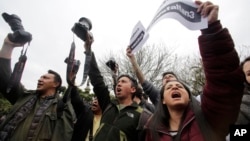Journalists kidnapped a week ago along Ecuador's increasingly conflictive border with Colombia have appeared in a video appealing to Ecuadorean President Lenin Moreno.
In the 22-second proof-of-life video, the three men, chained together at their necks, relayed their captors' demands that Moreno release three unidentified combatants and end anti-narcotics cooperation with Colombia in exchange for their freedom.
"President Lenin Moreno, our life is in your hands," one of the journalists said in the video.
The two journalists and a driver from Ecuador's El Comercio were taken hostage nine days ago while investigating a rise in drug-fueled violence along Ecuador's northern border that had led to several deadly assaults on military targets.
Authorities have blamed a holdout faction of the Revolutionary Armed Forces of Colombia that didn't lay down its weapons as part of a 2016 peace deal, but the press workers didn't identify their captors in the video.
In the video, which was obtained by Colombia's RCN network, the journalists suggested they were being held in Colombia despite repeated assurances from Colombia's Defense Ministry that they were not located inside the country. RCN didn't say how it obtained the video.
Several press groups have called for the journalists' release while their families have urged authorities to avoid a forced rescue that could end in bloodshed.
Moreno announced last month that he was sending 12,000 troops to combat drug gangs and boost security along the border. That represents about 10 percent of the small nation's police officers and troops.
Ecuador is a major transit zone for Colombian-produced cocaine that departs in small boats from the Pacifica coastline of South America up to Central America and onto the U.S.




